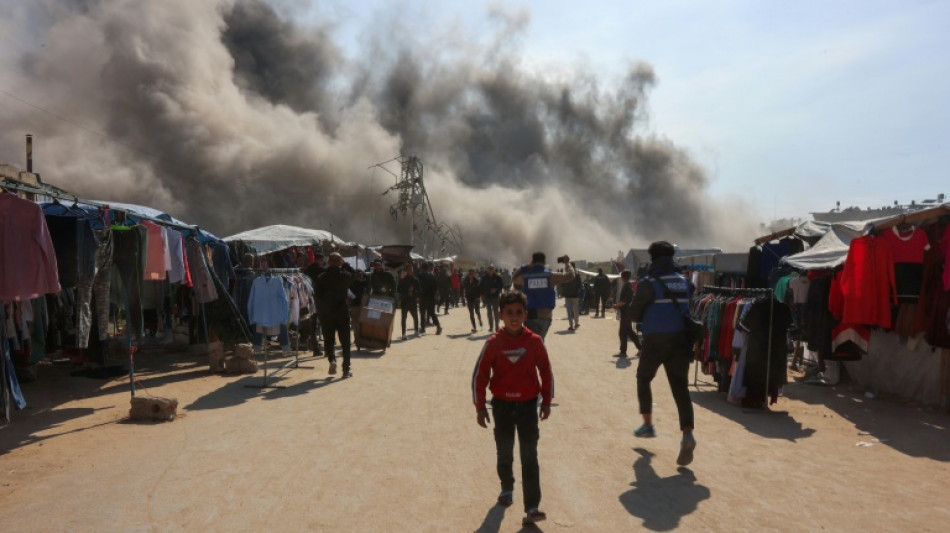
RBGPF
0.1400


Palestinian President Mahmud Abbas and French President Emmanuel Macron called for an "urgent" ceasefire in Gaza Monday, as Hamas said it is prepared to free all hostages provided it receives guarantees Israel will end the war.
Since the collapse of the ceasefire agreement between Israel and Hamas in mid-March, Israel has launched an intense military offensive in Gaza. Hundreds of thousands of people have since been displaced and Israel has blocked the entry of humanitarian aid.
In a phone call, Abbas and Macron "emphasised the urgent need for a ceasefire, the acceleration of humanitarian aid delivery (and) the rejection of the displacement of the Palestinian people from their land," the official Palestinian news agency Wafa reported.
"Both leaders reiterated the necessity of advancing a two-state solution based on international legitimacy", and for the Palestinian Authority to take responsibility in the Gaza Strip after the war ends, it added.
Macron, following his conversation with Abbas, said on X that "France is fully mobilised for the liberation of all hostages, a return to a durable ceasefire and immediate access for humanitarian aid into Gaza".
He also advocated "reform" of the Palestinian Authority as part of a plan that would see the Ramallah-based body, which currently has partial administrative control in the occupied West Bank, govern a post-war Gaza without Hamas.
"It is essential to set a framework for the day after: disarm and sideline Hamas, define credible governance and reform the Palestinian Authority," Macron said.
- 'No negotiation' over weapons -
Senior Hamas official Taher al-Nunu indicated that the group was willing to release all hostages in exchange for a "serious prisoner swap" and guarantees that Israel would end the war.
"The issue is not the number of captives," Nunu said, "but rather that the occupation is reneging on its commitments, blocking the implementation of the ceasefire agreement and continuing the war".
"Hamas has therefore stressed the need for guarantees to compel the occupation (Israel) to uphold the agreement," he added after the group held talks with Egyptian and Qatari mediators in Cairo.
However, he said Hamas will not give up its arms.
"The weapons of the resistance are not up for negotiation," Nunu said.
The first phase, which began on January 19 and included multiple hostage-prisoner exchanges, lasted two months before disintegrating.
Israel had sought to extend the first phase. Hamas insisted that negotiations be held for the second phase under the deal, as outlined by former US president Joe Biden.
Macron announced last week that Paris could recognise a Palestinian state within months, triggering sharp criticisms in Israel.
"We must move towards recognition, and we will do so in the coming months," Macron said in a television interview.
- 'Gravely mistaken' -
Nearly 150 countries recognise a Palestinian state but France would be the most significant European power to do so.
Such formal recognition by Paris would mark a major policy switch and risk antagonising Israel, which insists such moves by foreign states are premature.
"President Macron is gravely mistaken in continuing to promote the idea of a Palestinian state in the heart of our land -- a state whose sole aspiration is the destruction of Israel," Netanyahu said in a statement.
Israeli teacher Nurit Sperling told AFP, in French, that Macron "absolutely shouldn't have done that".
"I think we saw on October 7 that it's not feasible. We can't live like this, next to them, in this way," she said, referring to Hamas's October 7, 2023 attack on Israel which began the Gaza war.
The United States has also long resisted recognition of a Palestinian state.
Qatari Emir Sheikh Tamim bin Hamad Al-Thani and Egypt's President Abdel Fattah al-Sisi met in Doha where they supported creating a Palestinian state.
The two leaders "emphasised the centrality of the Palestinian cause as the foremost Arab issue".
H.Au--ThChM